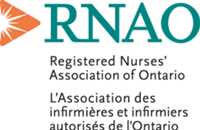RNAO applauds government for funding to hire more RNs in LTC, commitments to expand drug coverage to seniors, and improve mental health services
TORONTO, March 28, 2018 /CNW/ - Wednesday's health-focused budget shows a serious commitment by the government to improve the lives of all Ontarians.
Members of the Registered Nurses' Association of Ontario (RNAO) say the province's decision to improve access to care by providing $2.1 billion over four years to increase mental health and addiction services will go a long way towards supporting people who are struggling to get the help they need. "This is an essential investment and one that our members welcome given the number of people, including children and youth, who are suffering," says RNAO President Carol Timmings, who noted the commitment includes dedicated funding for Indigenous youth to receive culturally appropriate mental health services.
Timmings also lauded the government's decision to expand its OHIP+ program to eliminate deductibles and co-payments for seniors. "This builds on last year's decision to provide free medications for those 25 and under," says Timmings. "Our government is setting a precedent on the pharmacare file that other political parties and the federal government should note. Removing cost barriers for seniors and providing drug coverage for children will improve health outcomes and will result in lower heath system costs down the road. The next step is extending free drug coverage to all."
Another example of advancing health for all is the government's pledge to introduce a program to reimburse individuals and families who do not have workplace dental and prescription drug coverage or who are not covered by OHIP+ or other government-run programs.
RNAO is especially encouraged by commitments to Ontario's long-term care (LTC) sector. The promise to hire one additional registered nurse (RN) for each of the province's 627 nursing homes in the province, regardless of size, will improve the quality of care, especially given the increasing complexity of resident needs. "This announcement moves us a step forward to RNAO's call for a LTC staffing mix of at least one attending NP for every 120 residents, 20 per cent RNs, 25 per cent RPNs, and no more than 55 per cent personal supports workers (PSW)," says RNAO's CEO Doris Grinspun. A target to increase the daily amount of care for each person in LTC to an average of four hours is also welcome but RNAO says for that care to be effective and to meet the needs of residents, the commitment of four hours must be solely for nursing and personal care.
RNAO is also pleased with the 4.6 per cent increase ($822 million) in hospital funding. However, no increase in funding will deliver positive health outcomes for Ontarians if the right care providers are not in place. "The finance minister boasts about the number of full-time jobs created since the recession, however, there haven't been enough full-time permanent opportunities for RNs. In fact, RN employment fell in 2017 and RNs continue to be replaced by less qualified health professionals. Grinspun says she wants to see strong conditions attached to the funding to hire more RNs and end the dangerous practice of RN replacement. "This is an action RNAO has been urging for four years. There is clear evidence linking care provided by RNs with better health outcomes." In fact, Deputy Minister of Health Bob Bell is on record supporting that "patients classified as having tertiary or quaternary needs that are in acute care hospitals require RN care, as do most cancer patients," Grinspun says.
The association says the budget does not mention progress on the estimated 4,000 care co-ordinators, most of them RNs, who are now centralized in the province's 14 Local Health Integration Networks. "They need to be located in primary care settings if the government wants people to experience a more seamless health system experience," says Grinspun, noting that health systems that are not anchored in primary care will continue to lag behind other jurisdictions where primary care is at the centre and care coordinators help patients access services and navigate the health systems.
The budget also includes $2.3 billion over three years, including a three per cent increase in social assistance rates. The promise also includes measures to streamline the system's complexity.
Grinspun says she is encouraged to see language in the budget that references expanded scope of practice for NPs to prescribe controlled substances and its long-standing promise on RN prescribing. "We urge the government to move quickly to make the necessary legislative and regulatory changes so that people have greater access to care delivered by both RN and NPs."
RNAO applauds other measures mentioned in the budget to advance health for all:
- Continuation of funding for recruitment and retention in interprofessional primary care teams
- Minimum wage increase to $15 per hour on Jan. 1, 2019
- Free care for pre-school aged children beginning in 2020
- $425 million over four years to provide 2475 supportive housing units for people with mental health and addiction challenges
- Funding to help seniors remain in their homes
RNAO is the professional association representing registered nurses, nurse practitioners, and nursing students in Ontario. Since 1925, RNAO has advocated for healthy public policy, promoted excellence in nursing practice, increased nurses' contribution to shaping the health-care system, and influenced decisions that affect nurses and the public they serve. For more information about RNAO, visit our website at RNAO.ca or follow us on Facebook and Twitter.
SOURCE Registered Nurses' Association of Ontario

Marion Zych, Director of Communications, RNAO, Cell: 647-406-5605 / Phone: 416-408-5605, [email protected]

Share this article